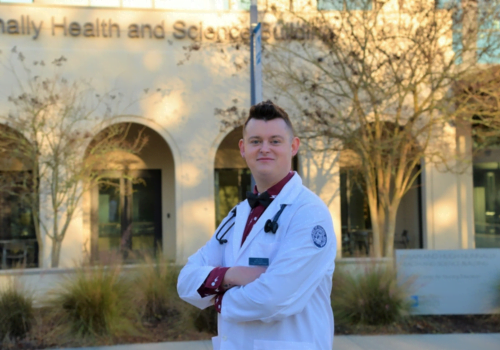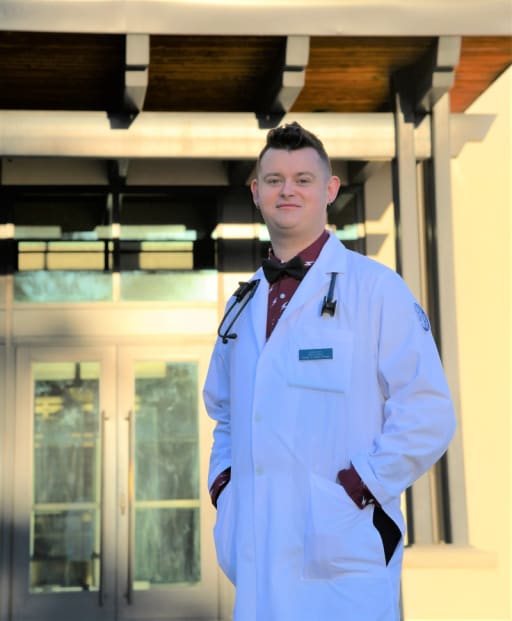
Finding a Special Niche
By Tiffany King
Senior Joey Lane came to the College of Coastal Georgia with an interesting set of skills that led him to finding a special niche within nursing. The Brantley County native will graduate this May with a Bachelor of Science in Nursing degree. He always heard about the College’s nursing and health sciences program while in high school, and even participated in a certified nursing assistant program. However, after graduating from high school, he decided to take some time to think about a career in healthcare and turned to his other passion—doing hair.

Lane attended cosmetology school and worked as a hairdresser for a few years, describing it as a fun time, but he still felt the tug for a career in healthcare. He said hairdressing prepared him for nursing school. Nursing and hairdressing are both service jobs, and involves touching people, and listening to clients’ concerns. He had the idea to merge his love of doing hair with nursing. He did his prerequisites volunteering at Hospice of Golden Isles and developed a program where he did hair for hospice patients. Lane shared the story of how he worked with an Alzheimer’s patient who was nonverbal. It had been some time since she had her hair done and he was given a photo of what she used to look like. When he was done, he put the mirror in front of her and the look in her eyes changed. A smile was on her face—she recognized herself. To see how she was comforted by a simple task truly amazed Lane. He wants to continue bringing a more personalized experience to healthcare.
“It’s already so depersonalizing being in a healthcare facility, and a lot of the older generation are used to getting their hair cut or rolled once a week,” he said. “Doing their hair made them feel a little bit more comfortable. That helped develop what I wanted to be as a nurse—focusing on patient dignity. One of my biggest passions is where critical care meets end of life and palliative care.”
Palliative care focuses on providing patients relief from pain and other symptoms of a serious illness. It also involves improving the quality of life for both patients and their families.
Lane shared how we as a culture are uncomfortable talking about death and dying. Serving at hospice got him comfortable talking about that topic. Not only would he do patients’ hair, but he would also sit and talk with them as they shared their feelings, and even as some passed away so they wouldn’t feel alone. He feels it’s important for nurses to understand the intersection of critical care and end of life and palliative care.
“In critical care, we’re conditioned and have so much technology now. We’re really good at sustaining people, but when it comes to the point where we’re hurting them more than we’re helping them, we’re bad at letting go and helping them have some dignity still,” Lane said. “It’s strange to explain this to people. They say ‘You’re a critical care nurse. It’s your job to save people.’ But if they cannot be saved, let’s help them pass with dignity and comfort. That’s always just as important as saving them.”
Lane worked at Hospice of Golden Isles for two years before COVID-19, then did his clinicals in an emergency room. One of the biggest challenges Lane faced was experiencing hospice care from the perspective of the family member. His sister was in hospice and he took care of her, calling it full circle. Lane said the experience made him more empathetic and aware that nurses not only take care of the patient, but the family as well.
“If the patient is in the ICU on all these machines, it’s already overwhelming. If you go out of your way to make the patient look nice, you orchestrate what the family is going to remember. If they walk in and the patient is disheveled, that’s the last image they have in their head. That’s really an area where I became more cognizant and would like others to be more cognizant as well,” Lane said.
Unfortunately, his sister passed away and he had to return for the new semester and clinicals the next day. From then on, he started to see his sister in a lot of the patients he interacted with.
“It inspired me more to give patients the best care that they can receive,” he said. “Give them that compassionate care, make it personal, and make them feel dignified in any way I can.”
Looking Towards the Future
Lane has been given the opportunity to work at Duke University Hospital in the cardiac intensive care unit. He was drawn to Duke because of their status as a teaching hospital and magnet hospital. Magnet hospitals are healthcare facilities identified as having exceptional nursing standards and good work environments. Duke does shared governance with nurses who help make policies, Lane said, and is dedicated to evidence-based practices. After three years of working at Duke, Lane will be eligible to have up to 90 percent of his student loans forgiven and up to 90 percent of tuition covered to further his education at Duke. Lane described the application process as very streamlined and vigorous. He had two interviews and had to provide multiple references.

Duke offers a nursing residency program where nurses are hired into the area where they want to work. Lane will be working for the nonsurgical side of cardio thoracic surgery where he will tend to patients suffering from conditions such as heart failure, post-cardiac arrests, and post-heart attacks. He selected this unit because he’s fascinated with how the heart works like a machine and the different effects of treatment on the heart.
“I’m like a giant pathophysiology nerd. I love looking at why stuff happens, like if I give this med, this happens, versus if I give another kind. The intensive care unit definitely plays to my areas because of all the machines, and it’s really remarkable how they keep patients sustained,” Lane said.
Duke also has its own hospice care where Lane plans to spend some time volunteering. For graduate school, he wants to research the area where critical care meets hospice to help educate nurses. He also believes in the importance of nurses taking care of themselves when a patient they’ve gotten close to dies.
“I recently read that nursing students don’t feel prepared to handle their first patient death. I don’t think you can teach nursing students how to cope with it, but I think there should more education around death and palliative care,” Lane said. “It’s okay for nurses to cry with the family. They are comforted in knowing that a nurse genuinely cared.”
Part of a Community
Lane will definitely miss the nursing program after graduation. The professors and nursing students became a second family for him as he saw them more than anyone else. The nursing program is very vigorous at the College, and during emotional moments, its normal to see students comfort one another. There are also fun times, one being a group project where he dressed up like Kenny Rogers and sang for a drug commercial. Lane shared that as one of his favorite moments.
His advice to current nursing students is that they know more than they think.
“The first time you touch a real patient, you don’t feel like you know what you’re doing,” he said. “I just finished my practicum, and you start out by following a nurse. As you go through your 120 hours, the nurse starts to follow you. It really shows you how far you’ve come.”
Lane is not only excited for his future, but he feels prepared to carry on what he’s learned at the College well into his nursing career.
Outside of school, Lane enjoys volunteering, thrifting, anything related to The Simpsons, reading, and having fun at theme parks.
